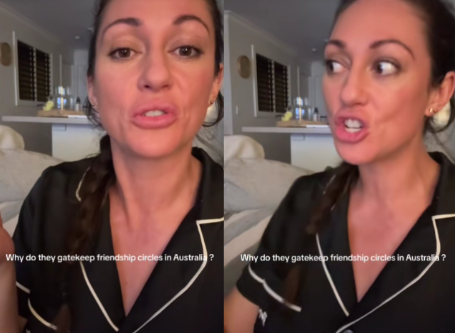
Feeling left out in your own community can be exhausting.
It can happen to anyone, at any stage of life.
For many Australians, breaking into established social circles feels almost impossible.
When UK expat Layla Subritzky spoke out about Australia's 'friendship gatekeeping' on social media, she struck a chord that resonated far beyond her own Gold Coast experience.
Her video about how difficult it was to form new friendships in Australia went viral, sparking a nationwide conversation about loneliness—a crisis affecting Australians of all generations, including seniors.
Source: TikTok/laylasubritzky
After 15 years in Australia, Layla still could not understand why friendship groups seemed so resistant to newcomers.
'In the UK, you meet someone really cool in the toilet on a night out, invite them to hang with your friends, and suddenly she's part of the group. In Australia, it's very strange. You meet someone you get along with, you're introduced to their friends, but you never cross over.'
While Layla's story highlighted barriers for younger adults, research shows loneliness affects 46 per cent of Australian seniors, making it far from a young person's problem alone.
Studies have found that 28.5 per cent of people over 60 experience loneliness to some degree, with severity increasing as people age further.
For older adults in aged care, the situation is even more stark.
Moderate loneliness was estimated at 61 per cent and severe loneliness at 35 per cent.
Exclusive friendship circles
The phenomenon Layla described—friendship circles acting like exclusive clubs—appears to be a distinctly Australian cultural trait.
Social media users responding to her video coined the term 'no cross contamination' to describe how different groups rarely mix.
One commenter explained: 'It's so common to have multiple birthday parties for your different groups. Work friends, high school friends, uni mates... they never mix.'
Geography has shaped this culture.
Australia's vast distances and scattered communities have historically encouraged friendships based on shared history rather than shared interests.
'Australia really is just one big country town,' one social media user noted.
'Our geographical isolation shapes how we form relationships. Friendships are built on shared history—like school or university—rather than shared interests.'
This historical context helps explain why conversations often start with 'Which school did you go to?'—it is a way to establish social credentials and common ground.
The economic cost of loneliness in Australia
The total cost of loneliness in Australia is estimated at around $2.7 billion.
People over 55 account for more than one-third of that cost due to increased health service use, including higher GP visits, emergency department presentations, and hospital admissions.
The health risks of isolation
For older Australians, social gatekeeping is more than inconvenient—it can be dangerous.
Loneliness increases the risk of premature death as much as obesity, smoking and physical inactivity and is a recognised risk factor for chronic diseases such as heart disease, diabetes and dementia.
Rural and regional older adults face additional barriers including limited transport, higher disability rates, poverty and reduced access to health services, leaving them particularly vulnerable to isolation.
The good news is that understanding the problem is the first step to solving it.
Experts suggest older Australians try joining activity-based groups rather than purely social ones, attending regular activities, exploring council initiatives, and using existing hobbies as a starting point for meeting new people.
Persistence is key.
Unlike younger people who may expect instant chemistry, forming meaningful friendships later in life often requires consistent contact over time and engaging in deeper conversations.
Communities are responding.
Monash University research shows that one in five older Australians feel lonely, especially those aged 75 and over, with rates rising to between 35 to 61 per cent for aged care residents.
Community programs and cultural change
Many councils now run programs specifically designed to combat social isolation, and activities such as volunteering, paid work, or caring for others are shown to safeguard against loneliness.
A broader cultural shift is also needed.
Social boundaries that characterise Australian friendship culture must be consciously challenged to reduce isolation.
Did you know?
Declining social contact The frequency of social contact, both in-person and online, has been declining across all age groups in Australia for decades, predating social media and smartphones.
Some Australians recognise the problem.
One social media commenter admitted: 'I'm sick to death of introducing friends and then somehow I'm the one left out. So yes, I gatekeep.'
While understandable, this mindset perpetuates the cycle that keeps newcomers isolated.
Breaking down social barriers requires both individual effort and community-wide recognition that traditional friendship models may do more harm than good, particularly as more Australians find themselves restarting social connections later in life.
What This Means For You
Loneliness affects Australians across all age groups, with seniors and aged care residents particularly vulnerable, highlighting that isolation is not just a young person's problem.
Australian friendship culture often creates exclusive circles, which makes it difficult for newcomers to integrate and can leave many feeling invisible or excluded.
Social isolation carries serious health and economic consequences, including a higher risk of chronic disease and increased strain on healthcare services.
However, practical strategies and community programs exist to help build meaningful connections, though broader cultural change is needed to break down these social barriers.
For you, whether you are trying to reconnect with old friends or make new ones, understanding these challenges can empower you to take small, consistent steps toward building the social life you deserve.
I've lived in Australia 15 years and there's an issue with the way women make friends here — UK expat Layla Subritzky explains her struggles forming friendships and how social circles often act as exclusive clubs.
https://www.dailymail.co.uk/femail/...stralia-15-years-theres-issue-women-here.html
Loneliness Statistics (2025): By Country, Demographics & More — Provides data on loneliness across age groups, showing that 62% of young adults and 46% of seniors report being lonely in Australia.
https://www.rootsofloneliness.com/loneliness-statistics
Older Australians facing a loneliness epidemic | InSight+ — Examines the prevalence of loneliness in people over 60 and aged care residents, highlighting moderate and severe loneliness rates.
https://insightplus.mja.com.au/2024/33/older-australians-facing-a-loneliness-epidemic/
Social Participation and Loneliness in Older Adults in a Rural Australian Context: Individual and Organizational Perspectives — Discusses how Australia's geographic isolation impacts relationships and the increasing proportion of the population aged 65 and older.
https://pmc.ncbi.nlm.nih.gov/articles/PMC11276585/
Older Australians join the fight against loneliness and social isolation—Monash University — Highlights strategies and programs for older adults to build connections, including engaging in council activities and deeper conversations.
https://www.monash.edu/news/article...fight-against-loneliness-and-social-isolation
Australia’s welfare 2023: data insights, Social isolation, loneliness and wellbeing — Shows participation in paid work, volunteering, and caring as safeguards against loneliness and notes a long-term decline in social contact across all age groups.
https://www.aihw.gov.au/reports/aus...nts/social-isolation-loneliness-and-wellbeing
Loneliness and Social Isolation in Aged Care | Ausmed — Highlights the health risks of loneliness, including increased risk of premature death and chronic diseases.
https://www.ausmed.com.au/learn/articles/loneliness-and-social-isolation-aged-care
If you’ve ever struggled to turn casual acquaintances into true friends, there’s a story that explores exactly how to do it in real life.
It follows someone who successfully navigated the challenges of forming lasting connections, offering practical tips along the way.
Reading about their journey can inspire and guide anyone looking to build deeper, more meaningful friendships.
Read more: Friends forever: Discover the secret to making lasting friendships in your golden years
What's your experience with Australian friendship culture—have you managed to break into established circles or found ways to form new connections later in life?







